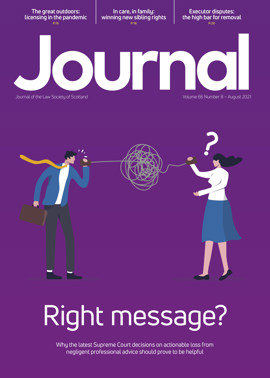Body donation: practice points
 The Human Tissue (Authorisation) (Scotland) Act 2019 introduced “deemed” consent for organ and tissue donation on death. This may impact on clients who wish to donate their body for medical/anatomical science and research on death (see Journal, July 2021, 16).
The Human Tissue (Authorisation) (Scotland) Act 2019 introduced “deemed” consent for organ and tissue donation on death. This may impact on clients who wish to donate their body for medical/anatomical science and research on death (see Journal, July 2021, 16).
What is the issue?
If a deceased’s family were not aware, at the time of death, of the deceased’s wish to have their body donated, deemed consent could allow for organ or tissue donation. Once organs or tissues are donated, unless it is just corneal transplant, the body cannot be accepted for donation.
What does this mean for me?
Practitioners should be aware of the opt-out organ and tissue donation system introduced by the 2019 Act and its implications for testators wanting to ensure their wishes are implemented.
What can I take away?
Clients need to talk to their family throughout their life about their wish to donate their body and consider opting out. Problems arise when family members are in dispute, often leaving a deceased’s wishes unimplemented.
What is the new regime?
The 2019 Act introduced a system of opt-out organ and tissue donation for those who die in Scotland. There are exemptions for (a) adults with incapacity, (b) those who have lived in Scotland for less than 12 months before their death, and (c) children under the age of 16.
Interestingly, children from the age of 12 can make a formal body donation declaration, just as they can make a will following the Age of Legal Capacity (Scotland) Act 1991.
Organ donation is generally only actionable for those patients who have been in intensive care. Body donation does not have this requirement. There are however upper and lower limits for BMIs of deceased who can be accepted, and recent surgery or certain conditions can make an individual ineligible.
Should my client opt out?
This is a live issue for those who wish to donate their body. The 2019 Act does not provide a legislative opt-out for those signed up to donate their body, nor is this perhaps practical given the current lack of a central donation register.
For those who would not consent to organ or tissue donation but wish to donate their body, the suggestion is they should opt out.
Not opting out would allow a testator flexibility – their wishes may change, or they might not be accepted for body donation.
Can my client be pre-approved for donation?
Unfortunately, it is not possible to confirm at the point of declaration whether the body will be accepted. Bequest coordinators can provide general advice on which conditions may prevent donation.
What should happen on death?
The executor, next of kin or attending doctor should immediately contact the university’s bequest coordinator following death. Delays can mean that the body is less likely to be accepted.
Universities generally work to a 50 mile limit, give or take, for collection of the body; otherwise the family may need to arrange the transportation direct. There is a degree of flexibility, however, in that the donation can be transferred to a different medical school. For example, Dougal Douglas retired to Glasgow’s West End but prepared a declaration to Aberdeen Medical School.
Is there a cost to donating?
Some clients may choose body donation because of concerns over rising funeral costs. The university will provide a free direct cremation, following the use of the body for up to three years. A minority of items can be retained for longer if they are of specific interest.
Can an attorney or guardian authorise donation?
No: it is delectus personae. It cannot be delegated to an attorney or guardian, even if there are explicit powers. Individuals should make the relevant declaration when they have capacity.
Is stating in a will a wish to be donated sufficient?
Very rarely, and wills are often only read after the funeral has passed.
Your client should complete, sign and have witnessed (in triplicate) the university’s declaration of bequest form. One copy should go to the university, another for storage with the will and another for the client’s personal papers. They should also advise their GP of their wishes so it can be added to their notes.
Regulars
Features
Briefings
- Criminal court: Sentencing deconstructed
- Family: Litigation and lottery wins
- Human rights: Reinforcing the right to be forgotten
- Pensions: Plugging the LGPS exit credit hole
- Criminal law: The future of sexual offence trials
- Scottish Solicitors' Discipline Tribunal
- Property: Heat networks: the key to low-carbon heating?
- In-house: Power of the nudge






